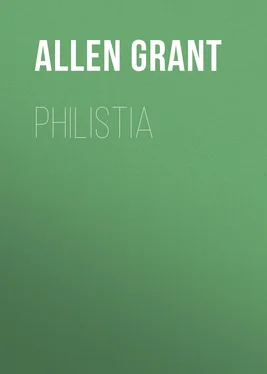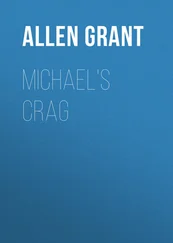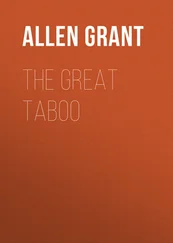Grant Allen - Philistia
Здесь есть возможность читать онлайн «Grant Allen - Philistia» — ознакомительный отрывок электронной книги совершенно бесплатно, а после прочтения отрывка купить полную версию. В некоторых случаях можно слушать аудио, скачать через торрент в формате fb2 и присутствует краткое содержание. Жанр: foreign_prose, literature_19, foreign_antique, на английском языке. Описание произведения, (предисловие) а так же отзывы посетителей доступны на портале библиотеки ЛибКат.
- Название:Philistia
- Автор:
- Жанр:
- Год:неизвестен
- ISBN:нет данных
- Рейтинг книги:5 / 5. Голосов: 1
-
Избранное:Добавить в избранное
- Отзывы:
-
Ваша оценка:
- 100
- 1
- 2
- 3
- 4
- 5
Philistia: краткое содержание, описание и аннотация
Предлагаем к чтению аннотацию, описание, краткое содержание или предисловие (зависит от того, что написал сам автор книги «Philistia»). Если вы не нашли необходимую информацию о книге — напишите в комментариях, мы постараемся отыскать её.
Philistia — читать онлайн ознакомительный отрывок
Ниже представлен текст книги, разбитый по страницам. Система сохранения места последней прочитанной страницы, позволяет с удобством читать онлайн бесплатно книгу «Philistia», без необходимости каждый раз заново искать на чём Вы остановились. Поставьте закладку, и сможете в любой момент перейти на страницу, на которой закончили чтение.
Интервал:
Закладка:
Grant Allen
Philistia
CHAPTER I
CHILDREN OF LIGHT
It was Sunday evening, and on Sundays Max Schurz, the chief of the London Socialists, always held his weekly receptions. That night his cosmopolitan refugee friends were all at liberty; his French disciples could pour in from the little lanes and courts in Soho, where, since the Commune, they had plied their peaceful trades as engravers, picture-framers, artists'-colourmen, models, pointers, and so forth—for most of them were hangers-on in one way or another of the artistic world; his German adherents could stroll round, pipe in mouth, from their printing-houses, their ham-and-beef shops, or their naturalists' chambers, where they stuffed birds or set up exotic butterflies in little cabinets—for most of them were more or less literary or scientific in their pursuits; and his few English sympathisers, chiefly dissatisfied philosophical Radicals of the upper classes, could drop in casually for a chat and a smoke, on their way home from the churches to which they had been dutifully escorting their un-emancipated wives and sisters. Max Schurz kept open house for all on Sunday evenings, and there was not a drawing-room in London better filled than his with the very advanced and not undistinguished set who alone had the much-prized entrée of his exclusive salon.
The salon itself did not form any component part of Max Schurz's own private residence in any way. The great Socialist, the man whose mandates shook the thrones of Russia and Austria, whose movements spread terror in Paris and Berlin, whose dictates were even obeyed in Kerry and in Chicago, occupied for his own use two small rooms at the top of a shabby composite tenement in a doubtful district of Marylebone. The little parlour where he carried on his trade of a microscope-lens grinder would not have sufficed to hold one-tenth of the eager half-washed crowd that pressed itself enthusiastically upon him every Sunday. But a large room on the ground floor of the tenement, opening towards the main street, was used during the week by one of his French refugee friends as a dancing-saloon; and in this room on every Sunday evening the uncrowned king of the proletariate Socialists was permitted to hold his royal levees. Thither all that was best and truest in the socially rebellions classes domiciled in London used to make its way; and there men calmly talked over the ultimate chances of social revolutions which would have made the hair of respectable Philistine Marylebone stand stiffly on end, had it only known the rank political heresies that were quietly hatching in its unconscious midst.
While Max Schurz's hall was rapidly filling with the polyglot crowd of democratic solidarists, Ernest Le Breton and his brother were waiting in the chilly little drawing-room at Epsilon Terrace, Bayswater, for the expected arrival of Harry Oswald. Ernest had promised to introduce Oswald to Max Schurz's reception; and it was now past eight o'clock, getting rather a late hour for those simple-minded, early-rising Communists. 'I'm afraid, Herbert,' said Ernest to his brother, 'he forgets that Max is a working-man who has to be at his trade again punctually by seven o'clock to-morrow. He thinks he's going out to a regular society At Home, where ten o'clock's considered just the beginning of the evening. Max won't at all like his turning up so late; it smells of non-productivity.'
'If Herr Schurz wants to convert the world,' Herbert answered chillily, rolling himself a tiny cigarette, 'he must convince the unproductive as well as the proletariate before he can set things fairly on the roll for better arrangement. The proletariate's all very well in its way, no doubt, but the unproductive happen to hold the key of the situation. One convert like you or me is worth a thousand ignorant East-end labourers, with nothing but their hands and their votes to count upon.'
'But you are not a convert, Herbert.'
'I didn't say I was. I'm a critic. There's no necessity to throw oneself open-armed into the embrace of either party. The wise man can wait and watch the progress of the game, backing the winner for the time being at all the critical moments, and hedging if necessary when the chances turn momentarily against the favourite. There's a ring at the bell: that's Oswald; let's go down to the door to meet him.'
Ernest ran down the stairs rapidly, as was his wont; Herbert followed in a more leisurely fashion, still rolling the cigarette between his delicate finger and thumb. 'Goodness gracious, Oswald!' Ernest exclaimed as his friend stepped in, 'why, you've actually come in evening dress! A white tie and all! What on earth will Max say? He'll be perfectly scandalised at such a shocking and unprecedented outrage. This will never do; you must dissemble somehow or other.'
Oswald laughed. 'I had no idea,' he said, 'Herr Schurz was such a truculent sans-culotte as that comes to. As it was an evening reception I thought, of course, one ought to turn up in evening clothes.'
'Evening clothes! My dear fellow, how on earth do you suppose a set of poor Leicester Square outlaws are going to get themselves correctly set up in black broadcloth coats and trousers? They might wash their white ties themselves, to be sure; they mostly do their own washing, I believe, in their own basins.' ('And not much at that either,' put in Herbert, parenthetically.) 'But as to evening clothes, why, they'd as soon think of arraying themselves for dinner in full court dress as of putting on an obscurantist swallow-tail. It's the badge of a class, a distinct aristocratic outrage; we must alter it at once, I assure you, Oswald.'
'At any rate,' said Oswald laughing, 'I've had the pleasure of finding myself accused for the first time in the course of my existence of being aristocratic. It's quite worth while going to Max Schurz's once in one's life, if it were only for the sake of that single new sensation.'
'Well, my dear fellow, we must rectify you, anyhow, before you go. Let me see; luckily you've got your dust-coat on, and you needn't take that off; it'll do splendidly to hide your coat and waistcoat. I'll lend you a blue tie, which will at once transform your upper man entirely. But you show the cloven hoof below; the trousers will surely betray you. They're absolutely inadmissible under any circumstances whatsoever, as the Court Circular says, and you must positively wear a coloured pair of Herbert's instead of them. Run upstairs quickly, there's a good fellow, and get rid of the mark of the Beast as fast as you can.'
Oswald did as he was told without demur, and in about a minute more presented himself again, with the mark of the Beast certainly most effectually obliterated, at least so far as outer appearance went. His blue tie, light dust-coat, and borrowed grey trousers, made up an ensemble much more like an omnibus conductor out for a holiday than a gentleman of the period in correct evening dress. 'Now mind,' Ernest said seriously, as he opened the door, 'whatever you do, Oswald, if you stew to death for it—and Schurz's rooms are often very close and hot, I can assure you—don't for heaven's sake go and unbutton your dust-coat. If you do they'll see at once you're a wolf in sheep's clothing, and I shouldn't be at all surprised if they were to turn and rend you. At least, I'm sure Max would be very much annoyed with me for unsocially introducing a plutocratic traitor into the bosom of the fold.'
They walked along briskly in the direction of Marylebone, and stopped at last at a dull, yellow-washed house, which bore on its door a very dingy brass plate, inscribed in red letters, 'M. et Mdlle. Tirard. Salon de Danse.' Ernest opened the door without ringing, and turned down the passage towards the salon. 'Remember,' he said, turning to Harry Oswald by way of a last warning, with his hand on the inner door-handle, 'coûte que coûte, my dear fellow, don't on any account open your dust-coat. No anti-social opinions; and please bear in mind that Max is, in his own way, a potentate.'
Читать дальшеИнтервал:
Закладка:
Похожие книги на «Philistia»
Представляем Вашему вниманию похожие книги на «Philistia» списком для выбора. Мы отобрали схожую по названию и смыслу литературу в надежде предоставить читателям больше вариантов отыскать новые, интересные, ещё непрочитанные произведения.
Обсуждение, отзывы о книге «Philistia» и просто собственные мнения читателей. Оставьте ваши комментарии, напишите, что Вы думаете о произведении, его смысле или главных героях. Укажите что конкретно понравилось, а что нет, и почему Вы так считаете.












